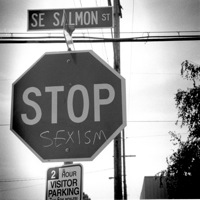 What I wrote on the subject of the the freethought bullies meme was promptly characterized as "another repetition of the hissy finger-pointy meme." Not quite what I was going for, but I won't be losing any sleep over it. I wasn't planning to revisit the subject of sexism so soon, but I've been asked by a couple of people to provide a concise explanation of what I meant when I suggested that there was a division in the atheist community. So I want to address that in a somewhat different manner.
What I wrote on the subject of the the freethought bullies meme was promptly characterized as "another repetition of the hissy finger-pointy meme." Not quite what I was going for, but I won't be losing any sleep over it. I wasn't planning to revisit the subject of sexism so soon, but I've been asked by a couple of people to provide a concise explanation of what I meant when I suggested that there was a division in the atheist community. So I want to address that in a somewhat different manner.Many people in the atheist community have strong feelings about the related subjects of sexism, misogyny, privilege, and feminism. This is not only not a problem; it is precisely what one would expect. The problem is that two factors are interfering with our ability to have productive discussions on these matters.
First, some in our community have said some truly vile things to women with whom they have disagreed. Feminist bloggers and members of their audience have been threatened, harassed, and called all sorts of degrading names. I cannot interpret this as anything other than evidence of misogyny. There is no excuse for this sort of behavior, and none of us should tolerate it.
Second, a few popular feminist bloggers have been using their status in our community to mock, belittle, and discredit atheists who express disagreement with them on matters related to women in the atheist community. Those who disagree with (or question) their positions have been accused of sexism or misogyny by some of these bloggers and their more ardent fans. When this behavior is called out, it is quickly dismissed.
I suspect that Ophelia Benson (Butterflies & Wheels), the blogger who wrote the post referenced above, would agree with my first point and probably not my second. That is fine. There may be "a very small but very dedicated and very obsessed group who hate the mythic beast FTB out of all proportion to its actual evil or importance;" however, I do not believe that my opinion on these issues has been influenced in any meaningful way by such a group.
Part of what makes these discussions so dicey is that the people I described in the second point above (i.e., the bloggers and their fans) should be upset with and extremely critical of those described in the first point (i.e., those spewing vile hate speech). We all should. Unfortunately, some bloggers and their fans are not distinguishing between those who disagree with them and those engaging in hate speech. That is, expressions of disagreement are being interpreted as evidence of misogyny. Put these two factors together, and it is no wonder that this is a challenging subject.